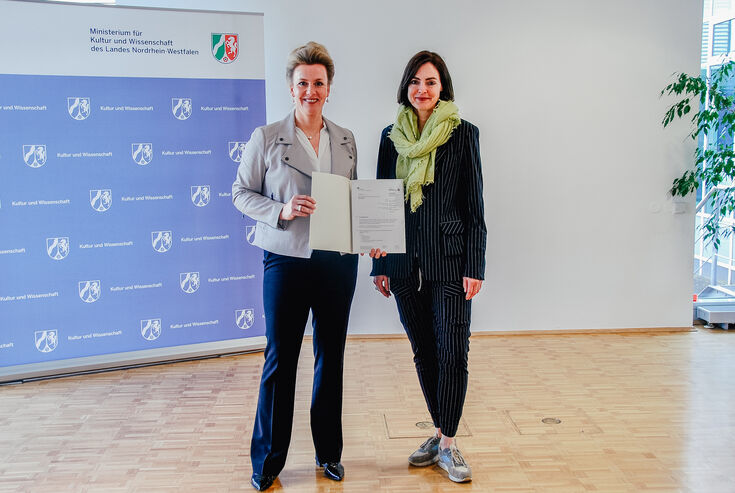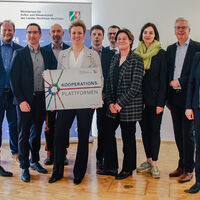Mönchengladbach. Clothing, shoes, furniture - the consumption of textiles is continuously increasing in the European Union. This has an impact on the climate, water and energy consumption, and the environment. Under the leadership of The Hochschule Niederrhein (HSNR), the project partners HSNR, DWI - Leibniz Institute for Interactive Materials and the Fraunhofer Institute for Environmental, Safety and Energy Technology UMSICHT will launch a cooperation platform starting in May 2023: With the "KlarTEXt" project, they want to overcome the obstacles for a sustainable and environmentally friendly textile industry. The project is being funded by the Ministry of Culture and Science of the State of North Rhine-Westphalia (MKW NRW) with around two million euros over four years.
Two to ten percent of the EU's environmental pollution is based on clothing consumption. This means that the increasing consumption of textiles over the entire life cycle of the products represents on average the fourth largest source of negative impact on the environment and climate change in the European Union. With its strategy for sustainable and recyclable textiles, the EU is now initiating the transformation of the textile industry: The aim is to improve the use and disposal of textile products on the one hand, and to minimize the discharge of fibrous microplastics on the other.
This necessary transformation poses major challenges for the 1400 German companies in the sector, most of which are SMEs. For eco-design requirements alone (e.g. resource efficiency or recycling), there are as yet neither specifications nor convincing solutions. Many of the companies need strong partnerships for this.
Exchange of expertise
This is exactly where the cooperation platform "KlarTEXt" comes in: Material, function, circularity as well as resource efficiency are omnipresent topics in science and industry with great development potential for society. The MKW is financing the development and establishment of the platform, which will simultaneously bundle the innovation needs of society and companies and translate them into scientific activities and teaching formats.
With the help of the cooperation platform, the cooperating researchers want to identify obstacles to a sustainable textile industry, define measures for overcoming them and work on the adjusting screws for a socially and ecologically sustainable textile industry. "KlarTEXt" aims to transfer the joint research fields of textile materials, functions, circularity as well as resource efficiency for increased innovation in companies. Furthermore, the research topics are to be shared with society in an understandable language. Through this economic and social participation, future innovations from the fields of biopolymers and biotechnology, among others, are thus provided with relevance for the textile industry.
Already interested in networking
Supporters since the very beginning and further cooperation partners include the Wuppertal Institute for Climate, Environment, Energy (WI), the Nova Institute, the German Society for International Cooperation (GIZ), the Cluster of Industrial Biotechnology (CLIB) and C&A's FIT GmbH as well as numerous other companies from the textile sector. With the help of the digital networking platform as well as the various interactive event offers and formats, the project partners would like to create conditions for shaping the future of a sustainable textile industry.
This applies to representatives from industry and academia as well as people from the general population. "With 'KlarTEXt' we want to close the gap between science, industry and society with a focus on the textile and apparel industry. Participatory formats will enable exchange between citizen:s and companies on the research fields and societal issues related to important topics in the textile industry, such as technical innovations, reparability, ecological materials, fast and fair fashion," explains Professor Maike Rabe. Among other things, citizens can look forward to great offers on textile sustainability at the OecherLab (Aachen), the Junior University (Mönchengladbach), the Supermarket of Ideas (Oberhausen) and the Decentralized BioLab (Dortmund).
Attachment: Photos (Copyright MKW): 1) Minister Ina Brandes and Professor Maike Rabe; 2) Group photo of the network partners and Minister Brandes.



















